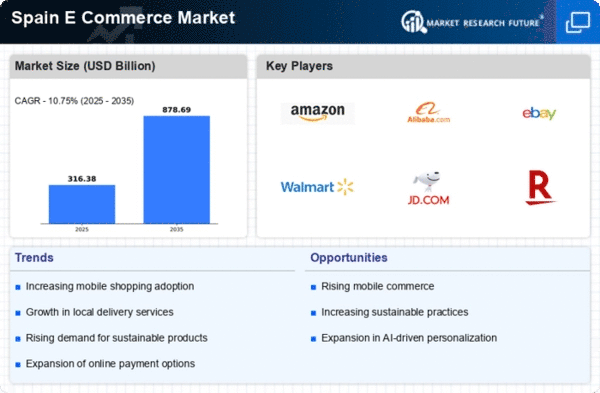Shifts in Consumer Behavior and Preferences
The e commerce market in Spain is witnessing shifts in consumer behavior and preferences, which are reshaping the landscape of online shopping. Consumers are increasingly prioritizing convenience, personalization, and sustainability in their purchasing decisions. In 2025, it is estimated that 70% of consumers will prefer brands that offer personalized shopping experiences, indicating a strong demand for tailored marketing strategies. Additionally, the e commerce market is seeing a rise in ethical consumerism, with more shoppers seeking out sustainable products and transparent supply chains. This shift is prompting businesses to adapt their offerings and marketing approaches to align with consumer values. As these behavioral changes continue to evolve, they are likely to drive innovation and competition within the e commerce market in Spain.
Expansion of Logistics and Delivery Services
The e commerce market in Spain is significantly influenced by the expansion of logistics and delivery services. With the rise in online shopping, consumers increasingly demand faster and more reliable delivery options. In 2025, it is projected that 60% of e commerce transactions will include same-day or next-day delivery services, reflecting a shift in consumer expectations. Companies are investing heavily in logistics infrastructure, including automated warehouses and advanced tracking systems, to meet these demands. This evolution not only enhances customer satisfaction but also encourages repeat purchases, thereby driving revenue growth in the e commerce market. Additionally, partnerships with local courier services are becoming more common, allowing businesses to optimize their delivery networks and improve efficiency. As logistics capabilities continue to advance, they are likely to remain a key driver of growth in the e commerce market in Spain.
Technological Advancements in Payment Systems
The e commerce market in Spain is experiencing a notable transformation due to advancements in payment technologies. The integration of digital wallets, contactless payments, and cryptocurrencies is reshaping consumer purchasing behavior. In 2025, approximately 45% of online transactions in Spain are expected to be conducted through mobile payment solutions, reflecting a growing preference for convenience and security. This shift not only enhances the user experience but also encourages higher spending, as consumers feel more comfortable making purchases online. Furthermore, the e commerce market is likely to benefit from the increased adoption of biometric authentication methods, which could further streamline the payment process and reduce fraud. As these technologies continue to evolve, they are expected to play a crucial role in driving growth within the e commerce market in Spain.
Regulatory Changes and Compliance Requirements
The e commerce market in Spain is increasingly affected by regulatory changes and compliance requirements. As the market grows, so does the need for businesses to adhere to various legal frameworks, including data protection and consumer rights legislation. In 2025, it is anticipated that stricter regulations will be implemented to enhance consumer protection and ensure fair trading practices. This evolving regulatory landscape may pose challenges for some businesses, particularly small enterprises that may struggle to keep up with compliance demands. However, it also presents opportunities for those who can navigate these regulations effectively, potentially gaining a competitive edge in the e commerce market. As companies adapt to these changes, they are likely to foster greater trust among consumers, which could further stimulate growth in the e commerce market in Spain.
Increased Internet Penetration and Digital Literacy
The e commerce market in Spain is benefiting from increased internet penetration and digital literacy among the population. As of 2025, approximately 90% of the Spanish population is expected to have internet access, with a significant portion engaging in online shopping. This widespread connectivity is fostering a more digitally savvy consumer base, which is crucial for the growth of the e commerce market. Furthermore, educational initiatives aimed at improving digital skills are empowering consumers to navigate online platforms more effectively. The rise of online shopping is also reflected in the increasing number of small and medium-sized enterprises (SMEs) entering the e commerce space, contributing to a more competitive market landscape. As digital literacy continues to improve, it is likely to further stimulate growth in the e commerce market in Spain.
















